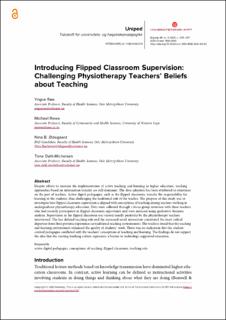Introducing Flipped Classroom Supervision: Challenging Physiotherapy Teachers’ Beliefs about Teaching
Peer reviewed, Journal article
Published version
Permanent lenke
https://hdl.handle.net/11250/2833078Utgivelsesdato
2021-11-12Metadata
Vis full innførselSamlinger
Originalversjon
https://doi.org/10.18261/issn.1893-8981-2021-04-03Sammendrag
Despite efforts to increase the implementation of active teaching and learning in higher education, teaching approaches based on information transfer are still dominant. The slow adoption has been attributed to reluctance on the part of teachers. Active digital pedagogies, such as the flipped classroom, transfer the responsibility for learning to the students, thus challenging the traditional role of the teacher. The purpose of this study was to investigate how flipped classroom supervision is aligned with conceptions of teaching among teachers working in undergraduate physiotherapy education. Data were collected through a focus-group interview with three teachers who had recently participated in flipped classroom supervision and were analysed using qualitative thematic analysis. Supervision in the flipped classroom was viewed mostly positively by the physiotherapy teachers interviewed. The less defined teaching role and the increased social interaction constituted the most radical departure from their previous experiences in traditional teaching environments. The teachers found that the teaching and learning environment enhanced the quality of students’ work. There was no indication that the student-centred pedagogies conflicted with the teachers’ conceptions of teaching and learning. The findings do not support the idea that the existing teaching culture represents a barrier to technology-supported education.

